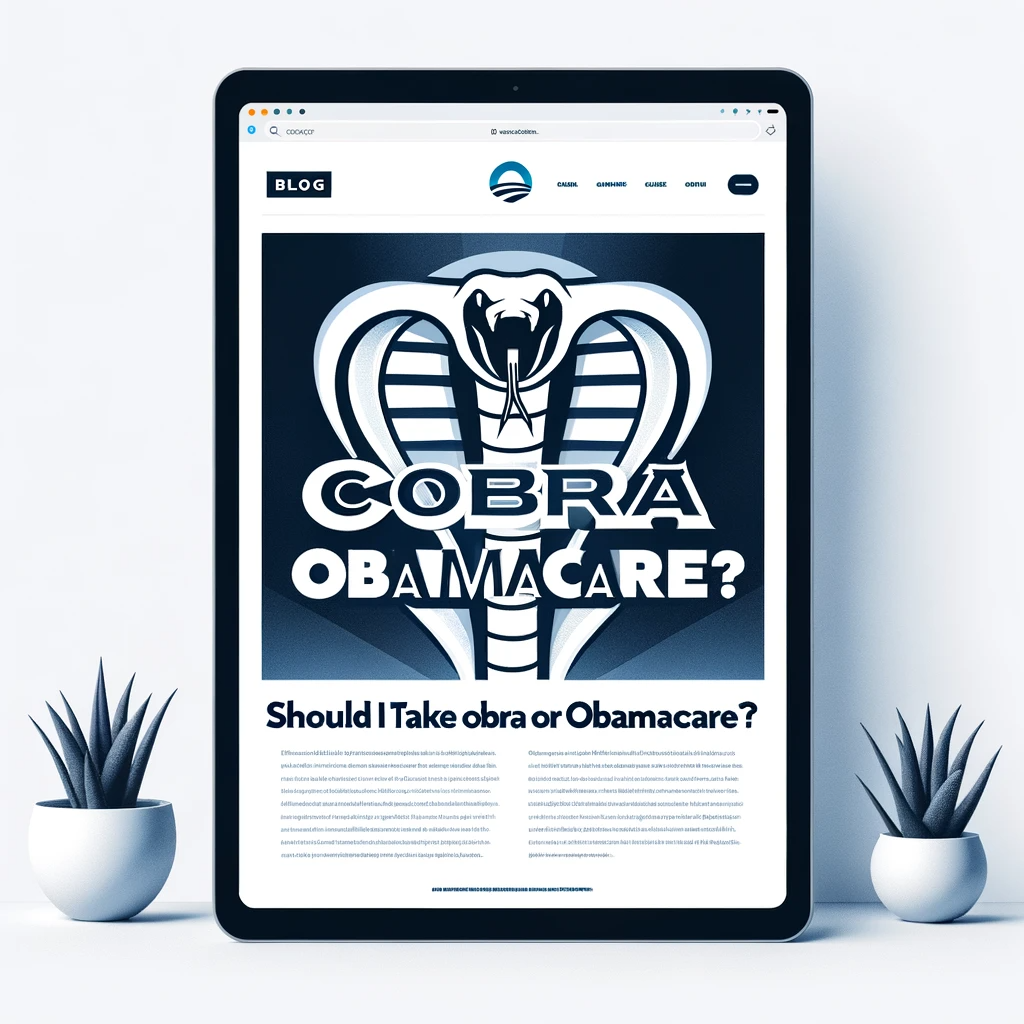Table of Contents
Introduction
In the convoluted labyrinth of healthcare choices, one question looms large like a menacing cloud: Should I take Cobra or Obamacare? It’s the eternal struggle, a perplexing conundrum that leaves many individuals in a state of bewilderment. People find themselves caught in the crossfire between the continuity provided by Cobra and the promises of accessibility and affordability brought forth by Obamacare.
It is an arduous decision that demands careful consideration and exploration of each option’s pros and cons. So, let us embark on this journey together, my dear readers, as we unravel the hidden details and lesser-known aspects behind this mind-boggling dichotomy.
The Dilemma: Cobra or Obamacare?
Before we dive into the depths of these two healthcare alternatives, it is crucial to acknowledge the profound dilemma they present. On one hand, we have Cobra (Consolidated Omnibus Budget Reconciliation Act), which offers a lifeline to those who have recently lost their jobs or experienced life-altering events such as divorce or death.
Cobra provides a means to maintain continuity of coverage by allowing individuals to remain on their previous employer’s plan for a limited time. On the other hand, we have Obamacare (officially known as the Affordable Care Act or ACA), an ambitious attempt at reforming America’s healthcare system.
This legislation aimed to dismantle barriers such as pre-existing conditions and ensure that every American has access to affordable healthcare coverage through state-run insurance marketplaces. However, it also introduced complexities that can leave even seasoned experts scratching their heads.
Exploring The Pros and Cons
Now that we understand the gravity of this choice, let us turn our attention towards exploring the pros and cons within each option. Starting with Cobra, its major advantage lies in continuity—allowing individuals to stick with their familiar insurance provider and maintaining comprehensive coverage without any disruptions.
For those with ongoing medical conditions or specific treatment needs, this familiarity can be a source of comfort and assurance. However, the drawbacks of Cobra cannot be ignored.
The first and most potent consideration is cost—a bane that plagues many who find themselves in situations necessitating Cobra coverage. The price tag associated with Cobra can be exorbitant, often leaving individuals reeling from the blow to their wallets.
Moreover, this is no long-term solution; Cobra coverage lasts for a limited duration, typically 18 to 36 months depending on the circumstances. It becomes a temporary lifeline that eventually snaps, leaving individuals stranded in a healthcare limbo.
Shifting our gaze towards Obamacare, we are lured by its promise of accessibility and affordability for all. Never again shall pre-existing conditions place an ironclad lock on one’s ability to obtain health insurance coverage.
Subsidies and financial assistance options open doors previously bolted shut due to economic constraints. Additionally, Obamacare provides increased coverage options through state-run marketplaces, allowing individuals to select plans that align with their unique needs.
However, beneath this enticing facade lies a complex web of intricacies within Obamacare’s implementation. Navigating the marketplace itself can become a Sisyphean task for those unaccustomed to deciphering its intricacies—endless forms, bewildering terminology, and confusing jargon that make one yearn for simplicity.
Furthermore, limitations in network coverage can restrict individuals’ choice of providers or hospitals when enrolled in certain plans under ACA’s umbrella. Let us not forget the impact on taxes; penalties and exemptions lurk within the labyrinthine maze of tax forms if one fails to comply with ACA’s mandate.
My dear readers, we have merely scratched the surface of this monumental decision—Cobra or Obamacare? We have glimpsed at the dilemma it poses while exploring their respective pros and cons but have yet to unveil the hidden details and lesser-known aspects that lie beneath.
Fear not, for in the coming sections, we shall uncover these secrets and illuminate the path towards making an informed choice. Prepare yourselves for a journey of enlightenment into the heart of this healthcare conundrum.
Understanding Cobra
What is Cobra?
Cobra, or the Consolidated Omnibus Budget Reconciliation Act, is a program that allows individuals to continue their employer-sponsored health insurance coverage after leaving their job. It’s like a safety net, preventing you from falling into the abyss of being uninsured and vulnerable to exorbitant medical costs. In theory, it sounds like a knight in shining armor, but let me tell you, this so-called “solution” is merely a wolf in sheep’s clothing.
Definition and origin
Cobra was enacted in 1985 as part of an alleged attempt to protect employees who found themselves suddenly unemployed. Supposedly, it aimed to provide them with temporary health insurance coverage until they could secure another job or find an alternative insurance option. Well-intentioned perhaps, but its execution leaves much to be desired.
Eligibility criteria
Now let’s talk about who can actually benefit from this mythical creature called Cobra. To qualify for Cobra coverage, you must have been enrolled in your employer’s group health plan before leaving your job. Sounds simple enough?
Think again! You see, this eligibility has an expiration date attached to it – you have a mere 60 days from the end of your employment or when your previous coverage ends (whichever comes first) to elect Cobra.
Miss that deadline by even one day and poof! Your opportunity disappears into thin air.
Benefits of choosing Cobra
Continuity of coverage
One glimmering jewel amidst all the chaos and confusion surrounding Cobra is the promise of continuity of coverage. By opting for this plan, you can maintain the same healthcare benefits you had while employed – no need to worry about switching doctors or adjusting to new networks. However, let us not forget that this continuity comes at a hefty price.
Familiarity with previous insurance provider
Another purported advantage of Cobra is the familiarity it provides. You already know your previous insurance provider, their policies, and how to navigate their convoluted bureaucracy.
This familiarity can offer a sense of comfort in an otherwise turbulent time. But is it worth the exorbitant costs and limitations that accompany this “comfort”?
Access to comprehensive healthcare services
Cobra promises access to comprehensive healthcare services, ensuring that you receive the care you need without any interruption or compromise. Need emergency surgery?
Cobra’s got your back. Unfortunately, its grip is so tight it might just squeeze every last penny out of your already depleted bank account.
Drawbacks of choosing Cobra
Cost considerations – the hefty price tag!
Ah, here we come face-to-face with the monstrous drawback of Cobra – its outrageous cost! Picture yourself gasping for air as you read through that first post-employment bill from your previous employer.
Brace yourself for sticker shock because what awaits you will leave you breathless and not in a good way. Without an employer subsidy, you’ll be expected to cover the full cost of your premium – meaning hundreds or even thousands of dollars per month snatched away from your hard-earned savings or limited income.
Limited duration – a temporary solution
While Cobra may seem like a savior in times of uncertainty, it’s nothing more than a temporary solution with an expiration date looming over your head like a dark cloud. Typically lasting only 18 months (or 36 months for certain qualifying events), this safety net will ultimately leave you hanging when you need it most – during long-term unemployment or severe health crises.
Dependency on employer’s plan
Perhaps one of the most infuriating aspects of Cobra is its reliance on your previous employer’s health plan. You are essentially at their mercy, subject to any changes they make to the plan or even worse, if they decide to discontinue it altogether. Suddenly, you find yourself tossed into the unpredictable sea of insurance options once again, struggling to stay afloat without the security you thought Cobra would provide.
While Cobra may seem enticing with its promises of continuity and familiarity, it quickly reveals itself as an overpriced and limited solution that leaves individuals vulnerable in the long run. Stay tuned for the next section where we dive into the intricacies of Obamacare and discover how it compares to this lackluster option.
Unraveling Obamacare (Affordable Care Act)
Overview of Obamacare
Oh, the infamous Affordable Care Act, or as it is commonly known, Obamacare. This healthcare reform law was enacted back in 2010 with the audacity to claim that it aimed to provide affordable and accessible healthcare for all Americans. Now, while the intentions behind this legislation may have been noble, the execution has left much to be desired.
The inception and purpose behind the ACA
Let’s take a trip down memory lane and remind ourselves of why this monstrosity of bureaucracy was unleashed upon us. The Affordable Care Act was born out of a desire to address the glaring issue of uninsured Americans and make healthcare more accessible. However, what started as an effort to bring about positive change quickly devolved into a convoluted mess of regulations and mandates that has burdened both individuals and businesses alike.
Key provisions and benefits
Now, let’s examine some of the key provisions that were supposed to make Obamacare a shining beacon of hope for all who lacked health insurance. One notable provision is the elimination of pre-existing condition exclusions.
Yes, you heard that right – no more being denied coverage or charged exorbitant premiums just because you had the audacity to be sick before seeking insurance. While this may sound great on paper, it inevitably leads to increased costs for everyone else who is now forced to foot the bill for those with pre-existing conditions.
But wait, there’s more! The ACA also introduced subsidies and financial assistance options for those deemed unable to afford insurance on their own.
While this may seem like a compassionate gesture by our benevolent government, it ultimately translates into higher taxes for hardworking individuals who are already struggling under an oppressive tax burden. And let us not forget about the promised increased coverage options under Obamacare.
Sure, you have more options to choose from, but what good are they if they come with astronomical premiums and limited network coverage? The reality is that many individuals are finding themselves with a surplus of options that are simply unaffordable or offer little in terms of actual healthcare access.
The hidden facets of Obamacare
Navigating the marketplace – a complex process
So, you’ve decided to give Obamacare a whirl and enter the infamous healthcare marketplace. Brace yourself for an overwhelming labyrinth of confusion and frustration.
Navigating this marketplace is akin to deciphering ancient hieroglyphics while blindfolded. From selecting a plan that suits your needs to understanding complicated terminology and jargon, it’s enough to make even the most patient among us want to tear their hair out.
Potential limitations in network coverage
One aspect that often gets overlooked when discussing Obamacare is the potential limitations in network coverage. While proponents will boast about increased access to healthcare, they conveniently forget to mention that many plans offered under Obamacare come with narrow networks. This means that your choice of doctors and hospitals may be severely restricted, leaving you scrambling for quality care when you need it most.
Impact on taxes – understanding penalties and exemptions
Ah yes, taxes – the ever-present burden we must all bear. Under Obamacare, failure to obtain health insurance can result in penalties imposed by our lovely Internal Revenue Service (IRS). However, fear not for there are exemptions available!
Of course, finding these exemptions can be akin to searching for a needle in a haystack while blindfolded. The amount of time and effort required just to understand your tax obligations under this law is mind-boggling.
While Obamacare may have had good intentions at its core (or so we were told), the reality is far from ideal. It has become an overcomplicated, burdensome system that fails to deliver on its promises of affordable and accessible healthcare.
The hidden facets and complexities of this law only serve to exacerbate the frustration and confusion experienced by individuals attempting to navigate and utilize its provisions. It’s high time we reevaluated this misguided legislation and sought out a more common-sense approach to healthcare reform.
Comparing Cobra vs Obamacare: The Showdown Begins!
Cost analysis
When it comes to comparing Cobra and Obamacare, cost is a crucial factor that cannot be ignored. Let’s dive into the financial implications of these two options.
First, let’s talk about premiums, deductibles, and co-pays. Cobra tends to be notoriously expensive, as it requires you to shoulder the full burden of your insurance premium without any employer subsidies.
On the other hand, Obamacare offers a range of plans with varying costs, including options for subsidies based on income levels. However, we must also consider short-term versus long-term affordability.
While Cobra may seem like a hefty blow to your wallet initially, it does provide continuity in coverage if you wish to stick with your previous insurance provider. Obamacare offers more flexibility in terms of plan selection and cost options but may not guarantee long-term stability if you frequently change jobs or experience changes in income.
Flexibility & Choice
In terms of flexibility and choice, there are clear distinctions between Cobra and Obamacare. Cobra comes with certain restrictions imposed by your previous employer’s plan, meaning you have limited options when it comes to selecting coverage that suits your specific needs.
There is no room for customization or tailoring the insurance to match your preferences. Obamacare brings an array of plans available through state healthcare exchanges or marketplaces.
This variety allows individuals and families to choose from multiple insurers and different coverage levels according to their unique circumstances. Whether you need comprehensive care or have specific requirements like vision or dental coverage – Obamacare provides the freedom to pick a plan that matches your situation best.
Access to Healthcare
The access one has to healthcare can make all the difference when deciding between Cobra and Obamacare. With Cobra, you maintain continuity in care since you already know the network of doctors and facilities associated with your previous employer’s plan. However, keep in mind that certain healthcare providers may not accept Cobra due to the high costs associated with it.
Obamacare aims to offer a broader network of healthcare providers, ensuring more options for individuals seeking medical services, especially those who have pre-existing conditions. The Affordable Care Act prohibits insurers from denying coverage based on pre-existing conditions, opening up access to quality care for those who may have been previously excluded.
Conclusion
In the showdown between Cobra and Obamacare, it becomes evident that each option has its advantages and drawbacks. While Cobra provides continuity in coverage and familiarity with your previous insurance provider, it comes at a steep price and lacks flexibility. On the other hand, Obamacare offers a variety of plans tailored to individual needs, subsidies based on income levels, and broader access to healthcare.
Ultimately, the decision between Cobra and Obamacare depends on your specific circumstances – financial situation, health requirements, and long-term stability. It is crucial to carefully evaluate all factors before making a choice.
However daunting this decision may seem at first glance, take solace in knowing that both options strive towards ensuring affordable access to quality healthcare for individuals like yourself. Embrace the power of choice and make an informed decision that suits your needs best!



